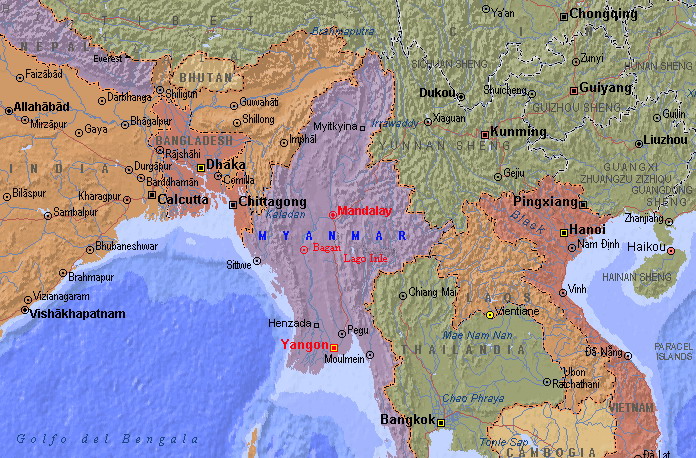|
In 2004 a
trip to Burma or Myanmar, as it is called today, always begins
with a question: do not go because of the military dictatorship,
or go because it is the only way to get in contact with
wonderful people, because the arrival of tourists promotes the
circulation of information and removes the country from
isolation ... Obviously we decided to go ...
The plane from Milan is coming to Yangon flying at low altitude
over the plain surrounding the city and unreal is already in our
eyes: it see only bamboo huts, streets are rows of red earth and
wherever there are pagodas with golden roof. When the door of
the aircraft was opened we are greeted by airport operators
strictly with flip flops and long skirt named Sarong also for men. In
Yangon,
we realize now that time has stood still here, nothing is what
characterizes modern Western cities, everyone has the flavor of
old, to surreal.
The thing that most impresses the visitor is obviously the
Shwedagon pagoda. We go barefoot in the religious area and here
we are young nuns shaved and dressed in pink, older monks
dressed in maroon and ordinary people who pray with unusual (for
us) rituals: using sticks of incense, pouring water into a
fountain .. but everything here has a fascinating mystical and
unreal. Meanwhile the sun sets quickly making the color of great
golden pagoda even more intense. The journey continues towards
the plain of Bagan, where the charm of history envelops the
visitor. Barefoot climbing the stairs of a temple at sunset you
can see thousands of pagodas of terracotta color that at the
sunset transform in red fire color. In
Burma
there are numerous historical and architectural wonders around
which is the life of ordinary people: peasants with long-horned
buffalo, craftsmen working lacquer, silver and gold foils used
for religious sacrifices. There are silk weavers who use archaic
wooden looms, market vendors sitting on sacks of rice, next to
baskets of colorful vegetables, meat exposed on worn wooden
boards, there are manufacturers of paper flowers used for
creating colorful umbrellas ...
Once in Mandalay we visit the Mahagandayon monastery, where you
can see the monks in their simple daily life with gestures
handed down from generations. At lunch time they line up in a
long line to receive a daily meal. Nearby is the U Bein Bridge,
the long teak footbridge a little creaky used by the inhabitants
on both sides of the river and improvised painters who contract
their work with tourists.
Mandalay
is the place where we come in contact with the
Irrawaddy
River,
2000 km long, the lifeblood for the Burmese. They use it to
transport, irrigation, watering livestock, washing clothes and
also to wash themselves.
Inle
Lake
is instead a place where peace and tranquility reign supreme.
The lake is shallow, has enabled us to develop a type of fishing
with nets made very specific form of basket.
The way to row with the help of leg is very special. All around
the villages of piles, where children go to school in canoes,
here we end up in the middle of a colorful floating market, we
visit a school full of kids with green and white uniforms and
cheeks covered with Thanaka a whitish cream obtained by grinding
roots. This cream is also used to stop the sun burning your
skin. Consider that in
Burma
pale skin is considered synonymous with beauty. Our journey ends
at the airport in
Yangon,
with much sadness we leave this wonderful country where we left
a part of our heart.
Stefano Gazzoli

|
